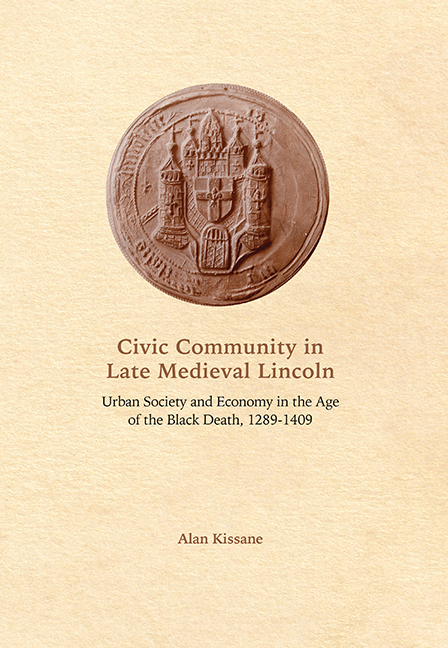 Civic Community in Late Medieval Lincoln
Civic Community in Late Medieval Lincoln Book contents
- Frontmatter
- Contents
- List of Illustrations
- Acknowledgements
- Abbreviations and Note on the Text
- Introduction
- 1 Urban Foundations: Occupational Structure
- 2 Lincoln as Entrepôt: Tolls, Trade and Credit
- 3 The Crown and the Fee Farm
- 4 The Growth of Civic Government
- 5 Fraternity, Orthodoxy and Communal Cooperation
- 6 Chantry Founders, Commemoration and the Rental Market
- Conclusion
- 1 Appendix 1: Occupational Sources and Data
- 2 Appendix 2: Lincoln Civic Officials, 1289-1409
- 3 Appendix 3: Lincoln Members of Parliament, c.1290-1410
- 4 Appendix 4: The Fraternal Year
- 5 Appendix 5: Perpetual Chantry Foundations
- Bibliography
- Index
- Frontmatter
- Contents
- List of Illustrations
- Acknowledgements
- Abbreviations and Note on the Text
- Introduction
- 1 Urban Foundations: Occupational Structure
- 2 Lincoln as Entrepôt: Tolls, Trade and Credit
- 3 The Crown and the Fee Farm
- 4 The Growth of Civic Government
- 5 Fraternity, Orthodoxy and Communal Cooperation
- 6 Chantry Founders, Commemoration and the Rental Market
- Conclusion
- 1 Appendix 1: Occupational Sources and Data
- 2 Appendix 2: Lincoln Civic Officials, 1289-1409
- 3 Appendix 3: Lincoln Members of Parliament, c.1290-1410
- 4 Appendix 4: The Fraternal Year
- 5 Appendix 5: Perpetual Chantry Foundations
- Bibliography
- Index
Summary
When, during the reign of Richard III, the civic government of Lincoln complained that the ‘decay and dystruccion of youre seyd pore Cite’, which in ‘aunciaunt tyme’ had been frequented by ‘Merchantez’ who ‘bought, and bartered wythin the seyd Cite with cloth, whereupon … [there] usede [to be] grete cloth makyng, and the people putt in occupation, wherby many … placez were inhabett that is nowe playne felde …’, they did a great disservice to their institutional forbears. Whilst it remained true that by this period the city had fewer inhabitants than in times past due to successive bouts of plague, the petition nevertheless glossed over the efforts of preceding generations to provide solutions to the decline of the once dominant textile industry. In particular, following its initial contraction in the thirteenth century, the city quickly established itself as a major centre for the wool trade, while after its re-emergence and subsequent decline in the second half of the fourteenth century, Lincoln saw commensurate growth in the service and agricultural sectors. Of course, it is to be remembered that the supplicatory tone and exaggerated nature of petitions such as this were intentional, and it would be egregious to suggest that the civic authorities were not unaware of these developments when they drafted the petition. Certainly, as the evidence for the later fourteenth century indicates, the local civic authorities were highly sensitive to changes in local and national politics. Considered in this way, this episode serves as a useful analogy for reviewing the two main conclusions of this study.
The first is that the relationship between royal towns and the crown remains central not only for understanding how local attitudes towards power and authority were defined but for exploring the social and economic experiences of individual towns more generally. The clearest illustration of this is the restitution of Lincoln's civil liberties in 1299, which set the tone for many of the developments of the following century. Not only did the intervention of the crown prompt the introduction of new rules for governing the town but it provided a solid platform for ‘new men’ to emerge, many of whom, unburdened by the political follies of the recent past, held links to the growing indigenous wool trade.
- Type
- Chapter
- Information
- Civic Community in Late Medieval LincolnUrban Society and Economy in the Age of the Black Death, 1289-1409, pp. 235 - 238Publisher: Boydell & BrewerPrint publication year: 2017


